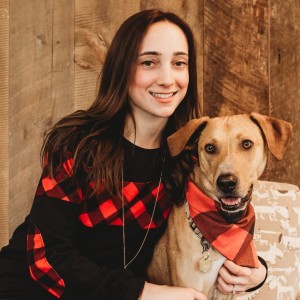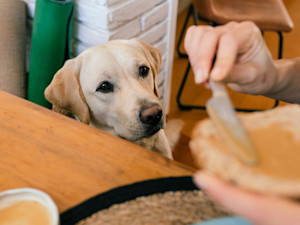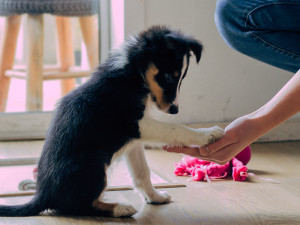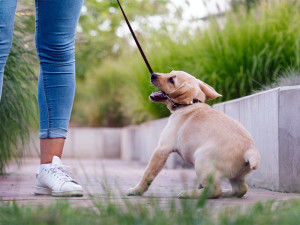What Do Puppy Sounds Mean?
Besides being ridiculously cute.

Share Article
In This Article:
What Sounds Do Puppies Make? Development of Vocalizations Signs Your Puppy Is Stressed By Sounds Introducing Sounds To Your Puppy Frequently Asked Questions
Did you just bring your new puppy home? Are you hearing sounds you have never heard a dog make before? Puppies can be very vocal as they are developing and different sounds can communicate different needs.
What sounds do puppies make?
Bringing home your puppy is an exciting time, and being prepared with all the supplies is a great way to be ready before your puppy comes home. It is also important to learn about puppy behaviors so that you can be sure to know what is happening with your puppy, and how you can best help them adjust to their new environment. A large part of puppy behaviors is puppy vocalizations. Just as a baby communicates its needs and wants through cries, a puppy’s vocalizations are used in a similar way.
Barking
A puppy or dog barking can mean many different things. Puppies may bark when they see another dog, and they want to play. They may bark when they see another dog because they are scared and want that other dog to stay away. When playing with another dog a puppy may bark as a form of communication. Barking may occur when a puppy is looking for attention.

One example would be when you are distracted on your phone and your puppy is in a playful mood. They may bark to say, “Hey! Play with me!” Be careful what you reinforce when a puppy is barking. It may be cute when they are little and less loud, but as they get bigger the barking may become bothersome. If your dog is barking during play, you can pause each time they bark and wait a few seconds before engaging again. If you are consistent, you will help train your dog to play quietly.
Loneliness can be another reason why you may find your puppy barks. If you leave them in another room or you are watching them from your camera and see that they are barking, this is likely because they are having a hard time being alone. If this occurs it may be best to begin crate training. It is always a good idea to work with a trainer when difficult behaviors arise with your puppy; this will help set them up for success in the future as an adult dog.
Whining
A puppy whine can be hard to resist, and it may make you want to snuggle your puppy. But you must be strong. Whining is another behavior that is a form of communication. When your puppy whines, they may be trying to tell you something. In puppyhood, whining is meant to let the mother dog know something is not right or that the puppy needs something. Puppies may also whine when they need to use the bathroom.
It’s best to keep your puppy on a schedule for bathroom breaks as you learn their potty cues. Always remember to take your puppy to the bathroom shortly after they play, eat or sleep. Is your puppy acting different and whining? This may warrant a vet visit, be sure to pay close attention to any behavior changes. Puppies can easily get into trouble by eating something they shouldn’t, so be sure to always have eyes on your puppy and if you can not watch them make sure they are secured in a puppy safe area.
Howling
With your puppy at home, does it sound like you have a wolf for a pet instead of a dog? Any sounds a puppy makes is a form of communication, and howling is no different. If your puppy is alone in their area, and they are howling, they may be lonely.
When puppies are taken from their mom and siblings, there is an adjustment period. They may howl when they are left alone for long periods of time because they are lonely and do not know how to comfort themselves yet. Depending on the breed of dog you have, they may howl as an instinct. Some breeds that are especially known for howling are the Basset Hound, Malamute, Husky, and Beagle breeds, to name a few.
Development of vocalizations
Puppies begin making sounds around two to three weeks of age. At the start, puppy sounds may be mostly grunts and whines. As they continue to grow they begin to develop yips and barks. Some puppies take some time to find their voice, but by the age of sixteen weeks they have usually figured it out.
Signs your puppy may be stressed by sounds
New sights and sounds can be scary to young puppies, especially during fear periods. Exposing them to as many different types of sights and sounds is an important part of socializing your puppy. If your puppy hears or sees something and begins showing signs of being stressed out, it is important to help them get more comfortable with what they are scared of at a young age in order to help prevent a fearful adult dog in the future.
Some signs your puppy may be stressed include lip licking, panting, drooling, hiding, trembling, and pinning their ears back. Depending on the level of fear your puppy has it may be best to enlist the help of a trainer. In order to help your puppy grow into a healthy adult, it is important to build good associations from the beginning.
How to introduce sounds to your puppy
Loud sounds can be scary! There are so many things your puppy has never heard before. If possible, it is good to introduce new sounds to your puppy in a controlled environment before the sounds become scary.
Think about where you live and what sounds may be intimidating to a young puppy. Thunder and fireworks are a good place to start, or maybe construction sounds. Begin by finding a recording of the sound you want to help desensitize your puppy to. You want to begin to build a positive association towards the scary sound. Food is a great way to help build a positive association—using yummy treats or their kibble is a great way to help.
Start by feeding your puppy something yummy and playing the scary sound at a very quiet level. Over a period of time as you see your puppy is comfortable with the sound you can make it louder. One way to tell your puppy is comfortable is that they are still eating and have not stopped. The minute you see your puppy begin to show any of the stress signals that were listed in the above paragraph that is how you know it is becoming too much for your puppy and you should dial it back. You may need to say at a certain sound level for a few sessions or a few days depending on the temperament of your puppy.
FAQs
Should I respond when my puppy whines?
Understanding the reason why your puppy is whining will determine if you should respond or not. If you think that your puppy is whining for attention, then it is best to ignore your puppy. If your puppy is whining due to fear or discomfort, then it is best to respond to your puppy and console them or try to figure out what is wrong.
What sounds are comforting to puppies?
Playing classical music is a great way to help comfort your puppy or even your full-grown dog! Did you know there is special classical music made for dogs that can help calm them? Playing classical music when you are out is a great way to help soothe your puppy when you are not around.
What is the “puppy whimper”?
A puppy may whimper if they are scared or hurt.
How can I stop my puppy from barking all the time?
If your puppy is barking a lot, they may be bored. Making sure your puppy has the right amount of stimulation is important to have a happy quiet puppy.
It is good to take your puppy on one or more unstructured walks a day. An unstructured walk is when you follow your puppy’s lead. Sniffing is an important behavior that your dog should be allowed to engage in. Allowing your puppy to go on a ten minute “sniffari” is better than taking your dog on a structured one hour walk. Sniffing will tire your puppy out and they will take a nice long nap. Another way to help prevent your puppy from barking is to help teach them to settle, this is where proper crate training is important. You can also use chew toys and treats to help your puppy calm down and prevent barking.
References
Cutler, Janet H., et al. “Puppy Socialization Practices of a Sample of Dog Owners from across Canada and the United States.” Journal of the American Veterinary Medical Association, vol. 251, no. 12, 15 Dec. 2017, pp. 1415–1423, https://doi.org/10.2460/javma.251.12.1415opens in new tab.
Frank, Diane, et al. “Puppy Behaviours When Left Home Alone: A Pilot Study.” Applied Animal Behaviour Science, vol. 104, no. 1-2, Apr. 2007, pp. 61–70, https://doi.org/10.1016/j.applanim.2006.05.003opens in new tab. Accessed 13 Apr. 2020.
KUTSUMI, Ai, et al. “Importance of Puppy Training for Future Behavior of the Dog.” Journal of Veterinary Medical Science, vol. 75, no. 2, 2013, pp. 141–149, https://doi.org/10.1292/jvms.12-0008opens in new tab.
Massenet, Mathilde, et al. “Nonlinear Vocal Phenomena Affect Human Perceptions of Distress, Size and Dominance in Puppy Whines.” Proceedings - Royal Society. Biological Sciences/Proceedings - Royal Society. Biological Sciences, vol. 289, no. 1973, 27 Apr. 2022, https://doi.org/10.1098/rspb.2022.0429opens in new tab.

Danielle Vrabel, CPDT-KA
Danielle Vrabel is a dog trainer who earned her CPDT-KA in 2020. Danielle is a proud pet mom of five pets: two dogs, two cats, and a corn snake. Danielle has fostered over ten dogs and fifteen cats and kittens, as well as helped train shelter dogs before they are adopted. Both of Danielle’s dogs are pet therapy dogs, where she also volunteers her time helping evaluate future therapy dogs.
Related articles
![Border Collie puppy shaking owner's hand]()
When to Start Training a Puppy: a Complete Puppy Training Schedule By Age
Your puppy training schedule, from eight weeks to six months. Let’s do this.
![Two hands holding a very young tan and white puppy up in front of a lake landscape]()
How to Socialize a Puppy
Everything you need to know to get your new addition off to a good start.
![a whining puppy]()
Why Is My Puppy Whining?
It’s the saddest sound in the world.
![Dog training at leash with a puppy.]()
How to Calm a Puppy Down
Yes, it is possible.
Can Dogs Communicate With Each Other?
It’s about more than barking.
![Jack Russell puppy grunting while laying on blanket and crying out]()
Listen Up! Your Puppy Is Trying to Talk to You
How to make sense of all those grunts and whines.








